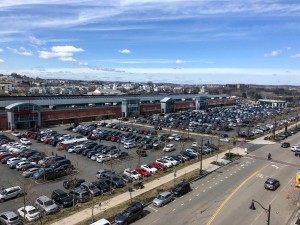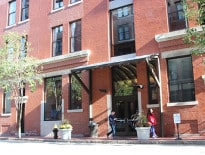Somerville’s Assembly Row is straining against the limits of its parking capacity as MBTA riders take advantage of 2,100 spaces near the 3-year-old Orange Line station, while shoppers check out 20 new shops and restaurants opening this year.
“It was a free-for-all for anyone and everyone coming to Assembly Row, including people jumping on the Orange Line and working in Boston for eight hours,” said David Middleton, Assembly Row’s assistant general manager.
Developer Federal Realty Investment Trust recently imposed new fees at the previously free Assembly Row garages. Turning to technology for an additional fix, it installed North America’s largest wireless parking sensor system in all 1,144 spaces at its neighboring Assembly Square Marketplace big-box center to enforce a new three-hour parking limit.
“Assembly Square is grappling with a problem not of its own making but one that affects the MBTA system as a whole: the shortage of affordable or free parking (at stations),” said Andy McClurg, a senior associate and transportation planner at Watertown-based Sasaki.
Federal Realty, a Maryland-based REIT, contributed $15 million toward construction of the new Assembly station which opened in 2015. State and federal grants paid for the rest of the $56 million project, but none of those funds went toward dedicated parking.
Federal Realty initially set aside a paid commuter parking lot, but the parcel is now being used for construction staging as the 5.7-million-square-foot development’s buildout continues.
Federal Realty estimates 200 drivers a day were using spaces in surface lots and garages, but not patronizing the retailers and movie theaters, Middleton said.
Maximum fees in the parking garages are now set at $2 up to five hours, reflecting typical times to do some shopping and grab dinner or a movie, Middleton said. After five and six hours, they escalate to $15 and $25.
A 1,600-space garage next to the 825,000-square-foot Partners Healthcare headquarters which opened in 2016 offers another safety valve, with 350 spaces reserved for retail after 5 p.m. and on weekends.

Steve Adams
Wireless Sensors Monitor Surface Parking
A possible solution emerged in a partnership between Federal Realty and Indect USA, a Texas company that works with developers on parking management.
Installed late last year at an up-front cost of approximately $400,000, the magnetic sensors are programmed to notify security via a web-based application if a vehicle exceeds the three-hour parking limit. Security guards place notes on vehicles that exceed the limit, and repeat violators can be towed, said Dale Fowler, president of Indect USA.
Last year’s arrival of a 12,500-square-foot Trader Joe’s grocery has worsened congestion at Assembly Square Marketplace, Fowler said.
“The area is getting busier and busier,” he said. “Trader Joe’s moved in and they drive a huge amount of traffic through the parking lot.”
Even with the new policies in place, the more than 1,000 public spaces in the outlet center garages fill to capacity between 1 and 3 p.m. most weekends, Middleton said.
“The fact that we’re moving to controlled parking (in the garages), we needed to do something for those 1,100 spaces or they were going to get bombarded. It helps all of our big box retailers,” he said.
Confusion with the new rules may be contributing to congestion at Assembly Row, said Jason Schrieber, a senior principal and transportation planner at Stantec. On a recent trip to Assembly Row, he observed drivers backing down the garage ramps rather than swipe their credit cards, which is required even to park free for the first three hours.
But if managed correctly, the surface parking lots offer an opportunity for Federal Realty to maximize its investment at Assembly Row, Schrieber said.
“That surface lot could be developable land,” he said. “That’s an opportunity any shopping mall developer should be thinking about.”
Audi Pumps Brakes On Self-Parking Pilot?
The parking predicament hints at the complexities of transportation planning for mixed-use developments such as Assembly Row and achieving the city of Somerville’s goal of 50 percent new trips to the property coming from transit, bicyclists and walkers.
The next phase of development is approved for 1.5 million square feet of office space and a 155-room hotel. At full buildout, the entire property would have nearly 11,000 parking spaces, including 5,600 for the office segment, according to permits approved in 2014.
A 2015 partnership between Audi and the city of Somerville billed Assembly Row as the proving group for a new autonomous vehicle initiative, including the design of a parking garage capable of housing self-parking vehicles.
Audi was scheduled to begin trials this year. The German automotive manufacturer has not moved ahead with any testing at Assembly Row, said Brad Rawson, Somerville’s director of transportation and infrastructure.
“We’re still in conversations with them and they’ve done some analysis and modeling work,” Rawson said, mentioning the recent death of an Arizona pedestrian struck by an Uber self-driving car as a turning point for the industry.
Audi did not respond to requests for an update on the Assembly Row program, but CNET reported Thursday that its head of self-driving vehicles, Alejandro Vukotich, resigned on March 22.




 |
| 

